C.A. Milson's Blog, page 145
February 17, 2019
Spotlight – The Society
[image error]
About the Author
[image error]
CG Abbot was born and raised in Colorado, graduated from college with a degree in business administration as well as a degree in Sacred Theology. While working in large companies and even Department of Defense, she dreamt of writing. She still resides in Colorado and enjoys creative outlets like scrapbooking, card making, photography, and painting in watercolor and acrylic. She inherited a love for reading from her family and grew up talking about books at the dinner table.
Website Address: www.cgabbot.yolasite.com
About the Book:
Title: THE SOCIETY
Author: C.G. Abbot
Publisher: Blazing Sword Publishing
Pages: 367
Genre: Suspense Thriller
[image error]
BOOK BLURB:
When Elizabeth Grant sees her childhood friend, she is thrown into a world of secret societies laced with conspiracies.
Elizabeth has been plagued with visions since the disappearance of Loralie. When she returns to the small town of her childhood, she’s unaware that she’s walking into the middle of what killed her friend.
Unknown to the rest of the world, The Society for a Restored America has been preparing to seize control of the government through manipulation of a national crisis. The Society’s membership has already infiltrated the government and military at the highest levels. The only thing between them and success is Elizabeth Grant.
Elizabeth must accept her special gift and stay alive long enough to uncover the Society’s dark plot to seize control from a nation that blindly supports them.
ORDER YOUR COPY:
https://www.amazon.com/Society-Elizabeth-Suspense-Thriller-Thrillers-ebook/dp/B07KN4MFTH/
Book Excerpt:
She hit the floor, hard. Thud. She just missed hitting her head on the nightstand. Her eyes darted around the room aglow with moonlight, out of breath from the nightmare. Where was she?
It wasn’t until her senses took in the ratty stuffed bear that sat on the white dresser, the white lace curtains that rustled from a whispered breeze heavy with scent of Magnolias, and the chorus of many crickets that she remembered. She was in Mississippi, hundreds of miles away from her Denver apartment. Her grandparent’s house, well… grandma’s ever since gramps had passed a few years ago.
Unease settled into the pit of her stomach, beyond what the vivid dream had produced. Loneliness assailed her and settled in her heart. Her first night back in Cyprus and her nightmares returned. Thought I was over all that.
Elizabeth took several deep breaths to steady her nerves and slow her breathing. Her muscles ached as she stood, legs like rubber and hands shaking. The recurring dream always produced such a physical reaction.
She knew from experience she wouldn’t… couldn’t, fall back asleep after her fight-or-flight response had kicked into overdrive. She made her way downstairs with care at each step.
Elizabeth grabbed the teakettle before its shrill whistle could disturb the tranquility; she was accustomed to living with a roommate and being quiet. Hopefully, some tea would help to calm her nerves… and her nausea. Another physical result of the nightmares. She poured the water over her waiting tea bag in a mug.
She rubbed her sore thigh and then rotated her aching shoulder from falling out of bed as the tea steeped. Her long chestnut hair was still disheveled and her pallor made the sprinkling of freckles across her face and cheeks stand out. Her heart was approaching a normal rate.
She settled into a worn chair in Grandma’s living room, last decorated a few decades ago when brown and gold country fabric patterns with heavy oak touches were all the rage. The scent of lemon furniture polish clung in the air. She breathed deeply the steam from the tea and let her breath out slowly. The subdued light from the one lamp created a cocoon of safety and comfort. Now that the adrenaline rush was fading maybe she could get another hour or two of sleep after all.
The nightmares would pass, she had to face them head-on like you would a bully.
She took in the room, each knick-knack and crocheted doily. She used to spend every summer with her grandma and grandpa. It had been like a second home. Her first summer spent here she was lonely, until she met Loralie, a local girl, in the park. She was only six and Loralie barely five then, and they had been like sisters from that moment. They were both raised by single moms and didn’t know their dads. Elizabeth’s life had changed in that instant in the park.
Until seven years ago when it all changed again, all because she didn’t come to visit over the summer. Her world shifted because of that simple decision. Loralie, the closest thing to a sister she ever had, disappeared the summer she didn’t come to visit, and worse – they had fought terribly only weeks before she vanished.
Digging up old bones.
Her life was moving along fine on a predictable path of school, and eventually college. When they had fought over Loralie’s brother, Jeremiah, she couldn’t have known that would be the last time they would speak, the last memory of her would be words of anger.
She took a sip of tea. Why had she started having the nightmares again? It had been over a year since the last one. But, this was her first visit to Mississippi since the night Loralie had gone missing.
Maybe just returning was enough to start her night terrors again. Shouldn’t it be ancient history and the nightmares long gone? Okay, she still felt guilty for not visiting that summer, as if she could have prevented whatever happened to Loralie.
She held out hope that her dearest friend had left town touring with a band or something and got out of Cyprus. One day her friend would call and share her adventures, and she’d be happy.
Nightmares were one thing and even understandable, but seeing things – visions or hallucinations – was a whole different matter.
The night Loralie went missing was the night she swore she saw a vision of Loralie in her bedroom in Denver, Colorado. An image of a beaten and bloody Loralie, who was physically in Cyprus hundreds of miles away, appeared right there in her bedroom, frantically reaching out to her. Then Elizabeth passed out. When she regained consciousness her mother was holding her in her arms and dabbing her face with a cold washcloth.
It was on Elizabeth’s insistent pleading that her mother called Mississippi in the middle of the night to ask a groggy Mrs. Carter to put Loralie on the phone. She remembered taking the phone, waiting for Loralie to talk to her so she could get that image out of her mind, only for Mrs. Carter to come back with ragged breaths and exclaim; “She’s not here. I can’t find her!”
It was the instant that she had that vision of Loralie which really changed her life. But she had seen her and was inconsolable for hours, so she was labeled “fragile”, “over-sensitive”, and “over-wrought”. Being at grandma’s was bringing it all back.
Digging up bones.
No physical trace was ever found of Loralie. Then the nightmares had started – and hallucinations of Loralie regularly over the last seven years. The nightmares terrified her, but the hallucinations… visions… whatever you called them – they left her doubting herself.
She made the mistake of researching what could cause hallucinations and was convinced she had a brain tumor or something for the first year. Still, she told nobody about her continued visions. As far as everybody else knew, her mother included, the night Loralie disappeared was the only time she experienced such a visual aberration, rather than the continual problem that plagued her still.
She shook her head to dismiss such serious thoughts. It was disconcerting to be here again. She wasn’t the same person who had last run happily through the house.
She rubbed her eyes and sipped at her tea, clearing her mind. She stiffened when she heard a car pull into the driveway. Every cell in her body listening.
This wasn’t Denver, people in rural little Cyprus were asleep at this hour. Maybe some were doing chores on the surrounding farms, but nobody was out visiting in the wee hours of the morning.
Barely audible footfalls on the veranda floorboards and a soft knocking at the door made her heart race. Just that quickly the feeling of a secure cocoon vanished – replaced by dread. She scanned the shadows and saw Loralie, forever sixteen, like an animated photograph, motioning with a degree of urgency for her to go answer the door. She swallowed, shakily set her tea down, and stood up.
Surely it’s nothing. It’ll be innocent, you’ll see. But, she felt like she was on the very edge of a cliff and everything in her life was about to change… again.
She took a deep breath to calm herself and rolled her shoulders back, crossed the living room to the door and slowly opened it.
On the wide white-painted veranda was an elderly black woman with her hand poised to knock again. She lowered her hand and smiled. It was wide genuine smile that made her eyes sparkle. In the illumination of the porch light, her coifed white hair looked more like a halo. She wore a turquoise cotton dress, was of average height, but stood proudly and with composure. Another time and place one might think she was Egyptian royalty.
“Hello dear, I’m Madame Antoinette of Shreveport, Louisiana. You must be Elizabeth. I’ve been driving all night to talk to you, hon.” Her voice was melodic with a reserved southern drawl. She watched expectantly as Elizabeth blinked a few times.
“Ma’am, you’re here to see me? At 4:30 in the morning? Are you sure you have the right house?” Elizabeth whispered because she instinctively felt the need to be quiet. A dog barked in the distance, then howled – a long mournful baying filled the air.
Madame looked around at the other houses on the street. All were dark and quiet. Returning her attention to Elizabeth she whispered, “I must speak with you about Loralie.” Looking around again she added, “I had to visit when it was least likely to be seen.”
~ ~ ~ ~ ~ ~ ~
February 11, 2019
Spotlight – People Skills 101
[image error]
About the Author
[image error]
Kerry O’Hallaron was born in St. Louis, MO. He attended college at the University of Missouri, and later “emigrated” to Florida. His passion in life is to help others maximize their own potential.
His latest book, “People Skills 101 – tm: How to Have More Friends, Fewer Conflicts, and Better Relationships,” is a compelling and life-changing new spin on one of the oldest “self-development” books in print. In it, he adds new color the art and science of people skills, which wealthy industrialist John D. Rockefeller called the most valuable asset under the sun. O’Hallaron teaches us in a humorous way how to use time-tested principles in our quest for friendships and positive business and personal relationships. The teachings aren’t new – but O’Hallaron’s unique twist on them certainly is. Whether you’re a shy, reserved introvert or a bubbly, outgoing extrovert, “People Skills 101” could be the only book you need to understand the simple tools that will help you both create and manage the perceptions people have of you.
You will be amazed how a few, subtle changes you can learn from this book will craft a new, more influential, more charismatic, more likable, YOU!
O’Hallaron lives in Tampa with his wife, Carol, and can’t seem to get away from spending significant parts of each year in his home town of St. Louis.
Website Address: www.peopleskills.training
Twitter Address: @ps101_book
Facebook Address: https://www.facebook.com/PeopleSkills101/
About the Book:
Title: PEOPLE SKILLS 101: HOW TO HAVE MORE FRIENDS, FEWER CONFLICTS AND BETTER RELATIONSPS
Author: Kerry O’Hallaron
Publisher: Shamrock Publications
Pages: 301
Genre: Nonfiction/Self-Help/Self-Development
[image error]
BOOK BLURB:
A life changing modern-day twist on Dale Carnegie’s timeless classic – learn how to have more friends, show more charisma, and better manage every relationship – all in the comfort of your home.
“Kerry O’Hallaron simply nailed it with People Skills 101,” says Jason Broadman, international book critic. “He took something everyone needs to know, which nobody teaches, and made it interesting, eminently readable, entertaining, and exceptionally useful to just about everyone.”
Do you remember that course you took in school called “Basic People Skills?” You don’t, do you – because nobody, anywhere, teaches such a course. Whether grade school, high school, or beyond, NOBODY thought it was important to teach us how to interact. NOBODY thought it was important enough to teach us interpersonal skills – how to get people to like us, how to get them to see us the way we want to be seen, how to manage our relationships.Apparently they just assumed that we are either born with “people skills” – or we weren’t!
People Skills 101 offers an elegantly simple and completely unique solution. It works, whether you are a shy and reserved introvert, a bubbly and outgoing extrovert, or anywhere in between. Simply choose any three of the twenty-one “GoldenRules” offered in the book, begin to use them faithfully, and watch the results with awe. You will be amazed how a few, subtle changes will quickly craft a new, more influential, more charismatic, more likable, YOU!
ORDER YOUR COPY:
Amazon
Book Excerpt:
1
How to INSTANTLY Become More Likeable
“Share your smile with the world. It’s a symbol of friendship and peace.”
(Christie Brinkley, American model, actress, and businesswoman, 1954- )
Legend has it that “Connie” (her real name – she’d be pleased to know that I’m sharing her story) came out of the womb with a smile on her face.
I wasn’t on this earth at the time, so I don’t know that for sure. I only knew her for the last two thirds of her many years. So let me share what I do know about her.
She was born in the Midwest United States, of hard-working middle-class parents who were not far removed from European immigrants. She had a happy childhood. In the middle of World War II, as a young adult, she married Don. They were together nearly sixty years – by all accounts a very happy union.
Connie, along with Don, raised six children. That alone was a herculean effort. Somehow, she managed to keep smiling through it all.
In the early 1970’s, as the children were progressing through their education, she entered the work force – during a time when many women could only get jobs as secretaries. Being a secretary, though, was not for Connie. Her exceptional work ethic and winning smile earned her the job of city clerk in her home town. She worked there until retirement, at which point she (showing her captivating smile as always) was featured in the local newspaper for being a one-of-a-kind woman.
She loved retirement, enjoying her relationships with Don, her children and grandchildren, and old friends. She lived the good life until the late 1990’s, when tragedy struck in the form of a massive stroke. Not one to give up easily, Connie survived the stroke well – except that it became difficult to verbalize what she was thinking. She thought clearly but spoke with great difficulty – often barely able to get a message across.
Previously, she had always communicated with a smile and a friendly word. Now she just had the smile, as many of her words did not make sense except to those closest to her.
If that bothered her, you’d never know it. Whenever someone came to visit her, her eyes lit up and her smile warmed the room. The smile projected a clear message: “Hi. I’m really glad to see you. I’m glad you are in my life. I’m glad you are here.” Her speech was challenged, but her communication was just a little different than yours and mine.
When Don died in 2004, she moved to a nice senior living facility, where her smile alone was enough to befriend residents and staff alike. She had constant visitors from her large extended family, friends, and residents, in spite of the speech challenge. Connie made life good.
I got to spend some time with her just a week before her death in 2014. We both seemed to know her time was coming – but she refused to give up that radiant smile even then. We spent time enjoying the beautiful surroundings of the home, looking at the flowers and listening to the birds. I talked; she smiled.
A week later, as she departed this world, she left behind a gift to everyone who knew her – now including you. She entrusted that wonderful, powerful smile to each of us, asking us to both keep it and share it with others, and make the world a little brighter place in the process.
(Rest in peace Connie O’Hallaron, a/k/a Mom, 1920-2014.)
Look around you, and you will see the effect a smile can have on people. A warm smile can strengthen a relationship. A smile from a physician in a hospital emergency room can instantly ease the patient’s fears. A smile in a job interview can put the candidate at ease. A sincere smile in a store may turn a “looker” into a customer.
The examples are endless. But Connie taught us best how powerful a genuine smile is, particularly in her later years. She realized that, because of her very limited speech, her primary way to communicate was through facial expressions. She knew, and she taught those of us who knew and loved her (it was impossible to know her without loving her), that the expression on her face had a powerful effect on the person she was sharing that expression with.
She knew that if she smiled that warm smile, it would make the person feel good, loved, wanted, happy – often all at the same time. She also knew that if she frowned, or otherwise showed anger or displeasure, she could immediately have a powerful negative impact on that person. She could ruin that person’s day, or their morning, or at a very minimum their mood for a short term, just with a frown.
She realized, either intuitively or consciously (or both), that what she projected would have a powerful effect on the person she projected it to – and that she greatly influenced whether that effect would be positive or negative. I’m not sure she ever actually wanted that kind of responsibility – but she was well prepared to handle it. She simply chose to have a positive impact on the lives of everyone she touched, every time she touched them!
I’d like to propose a little two-step exercise for you. The first step simply involves “people watching.”
Over the next few days, go about your work, family life, etc. doing things exactly as you’ve done in the past. However, pay close attention to the people you encounter. Watch for people who smile at you. I’m asking you to take a few days, because you may not encounter very many people who smile. But there will be some.
Watch carefully. Pay attention to the circumstances. Was it someone in the elevator, where most people try desperately to get to their floors without making eye contact? Was it someone in traffic? Was it a clerk at a store? Was it your spouse / significant other, child, or parent?
Now, as they smile at you, try to associate a meaning with the smile. In other words, try to imagine their smile is a form of communication, and guess what they are “saying.” What is the message that the person with the smile is conveying?
It may be, “Hi, how are you? Good to see you.” It may be, “Thanks for coming into our store/restaurant/place of business.” It may simply be a subconscious expression such as, “I’m friendly. Are you?” Or in a relationship, it may mean, “I’m really glad you’re here!” (My own beautiful wife realized the power of her smile over forty years ago when we first met, and she continues to use it daily to reinforce our relationship.)
OK, now it’s time to move on to part 2 of the exercise. In part 2, you do the exact same thing as in part 1, except as frequently as possible, make eye contact and smile at the other person. This may come easily to you, or it may not. But please try it. Do it several times a day for a few days.
And by the way, when you smile, do what Connie did and convey a message with your smile. The message should be appropriate to the person you’re smiling at. If it’s your boss, it should be along the lines of, “Hi, boss. It’s really good to see you.” If it’s a stranger, it should be along the lines of “Hi. How are you?” If it’s your significant other, you can use your own imagination, depending on the circumstances and his/her mood.
Here’s an easy trick: as you are smiling, think the message you are trying to project. If it’s your boss, think, “Hi, boss. It’s really good to see you.” Warning: this really works. So don’t smile at the boss while you are thinking, “Hi boss.You’re an idiot and I could do your job with my eyes closed!” Most people can “feel” when the message is incongruent. In other words, most people can sense an insincere smile!
So smile, think of the message you want to project, and watch closely when you do this. Watch their reactions, and try to imagine how they feel. You should see, as Connie did, that a simple, warm, genuine smile changes the entire trajectory of a person’s day, and maybe even of their whole life.
OK, one more homework assignment. But this one is simple. Think back to the last time you saw a baby smile. I’m told that after about six or eight weeks, many babies develop a “social smile.” In other words, after that age they really mean it – it’s not just “gas” or some involuntary reaction.
So think of the last time you saw a baby smile who was at least six or eight weeks old. If it’s ever happened, even once, I’m sure you remember it. The experience was almost priceless, wasn’t it? It’s hard to describe. It’s the same as any other person smiling, but so incredibly pure.
With a baby, there’s no possibility of a fake “politician” smile. It’s hard to know what the baby’s message is, because the baby doesn’t know a language yet that he/she can express with a smile. You get to assign your own message to the baby’s smile – but it’s almost certainly a positive message.
The baby might be saying, “OOH. You’re that nice person that feeds me. I like you.” Or, “You’re that nice lady that smells good and kisses me all over.” You don’t know exactly what the message is. All you know is, that smile warms your heart. Doesn’t it?
So how is it that so many of us intuitively know the power of a smile at eight weeks of age, and then proceed to forget it as we grow up?!!!
Connie’s smile would have melted your heart if you knew her. In fact, if you let it, just about every sincere smile you encounter will soften your disposition, improve your mood, make you feel better – and make you like the person who is doing the smiling. What if you were to simply turn things around, be on the giving end of a warm, sincere smile, and watch and feel the powerful effect it has on the other person? Try it. You’ll like it.
It takes less than a few seconds to smile. There are 86,400 seconds in every day. Make a commitment to invest just a few of them every day in giving genuine, warm, sincere smiles.
At the end of each section, we’ll propose a GoldenRule (see below). Each GoldenRule in this training will have some positive effect on your life and your relationships with others. They are all important and valuable. However, not one of them will have more of an impact than this one!
*****
GoldenRule #1
Smile like you genuinely mean it! Do it warmly and sincerely. It will move the world towards you in a small but unmistakable and irreversible way.
February 10, 2019
Release Blitz – Vincent Van Gogh: The Ambiguity of Insanity
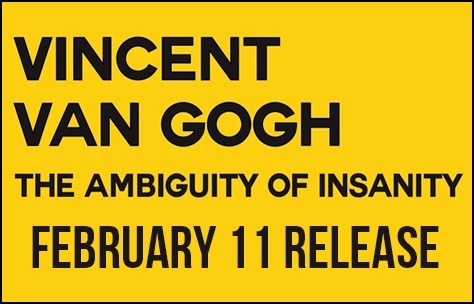
We’re scheduling a release blitz for “Vincent Van Gogh: The Ambiguity of Insanity” on February 11. We’re scheduling guest posts for the event. Please let us know if you’d like to host a guest post.
About the Book
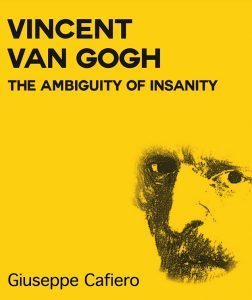 Title: Vincent Van Gogh: The Ambiguity of Insanity
Title: Vincent Van Gogh: The Ambiguity of Insanity
Author: Giuseppe Cafiero
An abrasive itinerary of the presence of women, the landscape and obsession. Such are the internal paradigms that went through the compelling life of the Post-Impressionist painter Vincent van Gogh.
Not flesh and blood women, but the woman as a guide: Mrs. Jones, the woman as a mother; Kee Vos; Christine Hoornik of Siena; Margot Begemann. The Portrait-women such as Augustine Roulin and Madame Ginoux. And then the backgrounds, endless, unforgettable in this genius’s works: Isleworth, Amsterdam, le Borinage, Arles, St. Remy, Auvers-sur-Oise, where Vincent van Gogh spent his life trying to capture the colors, the atmosphere, the light.
The pain of finitude and his obsession with achieving redemption through art, with intimate and stormy religiosity, with brotherly love, with the French noon sun and, in short, with death. A hard-working and unwavering life where art interacted, in a painful gesture, with the iron will of a hand that never lost its way.
The life of a beloved and devoted man, silenced by the anguish and despair of creation, who could only find peacefulness when he found his own death.
Vincent Van Gogh: the Ambiguity of Insanity is a fictionalized biography and gripping novel of the life of the Nineteenth-Century Dutch painter Vincent van Gogh. The author, Giuseppe Cafiero, draws a psychological portrait of the Post-Impressionist painter through the women that marked his life and the cities in which he lived.
Links
USA
Canada
Australia
UK
Demonised by Dad: Three Ways van Gogh’s Life was Influenced by his God-Fearing Father
Vincent van Gogh’s troubled relationship with his pastor father influenced the painter’s work and melancholic outlook, writes the acclaimed Italian author and historian, Giuseppe Cafiero.
By Giuseppe Cafiero
[image error]
Vincent van Gogh’s pious father, Theodorus, had a profound effect on his art and relationships. Here are three ways that van Gogh’s God-fearing father, Theodorus van Gogh, a pastor at the Dutch Reformed Church in Holland, influenced his son’s life.
A Pious Youth
Van Gogh was raised in a small village called Zundert in the Netherlands. Thanks to his father’s religious zeal, the painter’s early life was constrained by the Church. While his childhood in the poor, medieval village was said to be pleasant, van Gogh did in my view yearn for bigger, brighter and better things. He craved culture and the freedom to do what he wanted without societal, disciplinary and religious restrictions and his over-zealous father’s unrealistic expectations.
His Stillborn Brother
It is widely believed that van Gogh knew that in his father’s eyes, he was a disappointment and failure. Theodorus expected much of him as the oldest son, but Vincent never quite measured up; he had failed to follow in his father’s clergyman footsteps and had instead pursued his dream of becoming a painter. It is my view that Vincent lived under a constant pressure of living up to his father’s expectations and of ‘replacing’ his father’s first-born son, also named Vincent, who died at birth one year to the day before Vincent’s own birth.
Escaping God’s Wrath
In the years 1877 to 1880, van Gogh himself turned to religion. He became a fanatic and was obsessively devoted to the Bible and to its teachings. But his attempt at religious life was unsuccessful and sent the artist into a period of depression and spiritual crisis. This is reflected in his artwork at the time and also in the increasingly tense relationship with his father, who as above had always dreamed of Vincent following him into the Clergy.
Vincent Van Gogh: the Ambiguity of Insanity by Giuseppe Cafiero is out now as an audiobook on Amazon, Audible.com and iTunes
.
February 4, 2019
Spotlight – Obsessions of a Djinni
[image error]
About the Author
[image error]
Claudia Herring writes romantic fantasy novels. Her Djinn Chronicles series are set in a world of mysterious powers and tumultuous intrigues fraught with subterfuge. They begin in Regency England where sensible mortals interact in disbelief with djinnis, magicians, sorceresses, and soothsayers.
She would live in a library if she could.
Is afraid of her cat.
If you like Diana Gabaldon or Carol Berg, you’ll love Obsessions of a Djinni.
Website: https://claudiaherring.com/
Twitter: @claudiakherring
Facebook: claudia.herring.writer
About the Book:
Title: OBSESSIONS OF A DJINNI
Author: Claudia Herring
Publisher: Caravanserai Publishing
Pages: 374
Genre: Romantic Fantasy
[image error]
BOOK BLURB:
A djinni seduces his master’s young bride, forcing her to make a fateful choice.
A world of mysterious powers and tumultuous intrigues comes to life in Regency England as a djinni, burdened with a dark secret, is thrown into a love triangle fraught with subterfuge.
Will he defeat his nemesis or be betrayed?
ORDER YOUR COPY:
Amazon | Barnes & Noble
Book Excerpt:
Prologue
I am Djinn. I am abandoned.
Another day of countless days. Waiting. A torture, but not the worst I have endured.
The light of this place sets me on edge. I know not its origin. Where the brightness falls illumines my carpets, colors rivaling my jewels, the finest weave of silk from Persian masters, treasures on which to tread. But I would gladly tread a floor of dirt strewn with rushes if I could be free.
I stretch my arms above my head. My kurta shimmers around my body, the gossamer silk the hard work of thousands of industrious and sacred lepidopteran larvae and their keepers. I see the gleam of silver and gold, the glimmer of gems on my ivory tabletop reflecting the rubies’ blood red, the emeralds’ echoing green and the ancient amber of the topaz as if it were a soft, tranquil pond.
I will be called. I know not when. My impending summons looms over me like the sword Dionysius hung above Damocles. I pray my next master will be kind, for I have had enough of cruelty. And if I could have wishes, if I could follow my heart, I would search for my Thalia.
Meanwhile, I am here, in Bramley House, for many years now. I sense I am in the East wing, upstairs, in one of the older bedchambers. Of over a hundred rooms in this centuries-old manor, this is one rarely used. In here are cast-offs of years gone by.
Among the clutter and jumble sits a marble bust of some long-forgotten statesman, transported to these misty isles to adorn the august Roman villa of one of England’s early conquerors. A magnificent, life-sized bronze stands by the window—an Indian god with four arms, dancing, dancing, dancing, a Natraj, Shiva, who keeps this world, where I am forced to exist, in motion. A few steps away, above the mahogany escritoire, hangs a drawing, elaborately framed in burnished gold leaf, the flowing black ink magically coalescing into my lady, my Lavinia, my Thalia, fixing you in her grave gaze, her somber eyes conveying the tragedy I made of her life.
And on the mantel the etched brass urn, securely lidded, where I am prisoner—for how long I do not know.
I remember being in this great house, living in its rooms, a real person in a real place. Happy. Reunited with my beloved, my heart, my Thalia. I remember sunlight streaming at an angle through the wavy old glass, warming my black velvet jacket, dust motes floating in the rays like stars within a galaxy. My hair pulled back in a queue secured with a black velvet ribbon, the style of the time. I took it all in, my treasures, my manor, my love, my life.
Even I never realized how quickly it could change.
Book Blast – MOSTLY INNOCENT
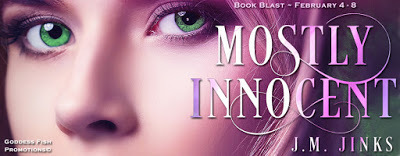
This post is part of a virtual book tour organized by Goddess Fish Promotions. J.M. Jinks will be awarding a $10 Amazon or B/N GC to a randomly drawn winner via rafflecopter during the tour. Click on the tour banner to see the other stops on the tour.
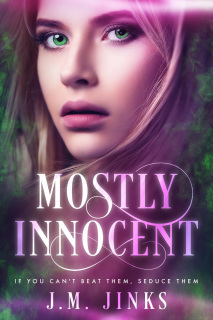
Meet Layla James, your typical smart and snarky chick—except for the whole succubus thing. After nearly a millennium on Earth, Layla’s settled down in a boring life in Palm Springs, until a smoking-hot hunter comes to arrest her for murder. But Layla knows the rules—she’d never kill someone and incite the wrath of The Powers That Be.
Elijah Daines is a hunter, maintaining the balance of good and evil in the mortal realm, his power stronger than any hunter she’s ever encountered. Plus, he’s a seriously sexy distraction. Too bad he’s accused her of a crime she didn’t commit.
As the killer continues a murder spree that not only frames Layla but threatens to expose the existence of supernatural creatures to humans, Layla and Elijah team up to investigate. Hopefully, they can fight off their escalating attraction for each other long enough to exonerate her and stop the murder madness.
Read an Excerpt
He edged nearer the counter. I, or maybe my succubus, decided on a whim I would not be intimidated by his power. I wasn’t sure where my sudden courage came from. He had to have sensed my succubus signature. We weren’t a violent race when we controlled our urges. I’m Queen of Control over here. I’m sure he knows I won’t hurt him. Right?
But why is he here? Something must be wrong.
With every step he took closer, I had a better look at him. His dark hair was in slight disarray and his crystal blue eyes scoured my face. He towered over me in every sense of the word. My stomach dipped.
He and Jolene should go back-to-back so I can get an accurate measure of his height.
I shook away my thoughts of him. Given his disapproving glare, he came here on a mission. Greek god or not, he was still a hunter, and I—
I was a product of evil, aka something he hunts.
“Succubus,” he growled. One little word filled with eons of unabashed hatred. It vibrated through me. All hopes of him wanting a new bathroom paint color vanished. No, this visit wouldn’t be pleasant, not at all.
Perhaps I could seduce him. Hell, he could do me right on the floor of aisle nine next to the light fixtures, if it kept him from killing me. I bit my lip. Hunters weren’t typically susceptible to succubi charms. A failed attempt of Aphrodisia could earn me more problems.
I released a breath. Some buried-deep, natural instinct rolled through me again, and I decided to stand my ground. I stood straighter and barked back, “Hunter.”
About the Author:

J.M. Jinks was born and raised in Southern California. She lives with her husband, two dogs, and two cats in her hometown. J has a Bachelor’s in French and a Master’s of Education. She is a teacher by day and a writer by night. J and her husband welcomed a baby boy in May 2018.
J has always had a love of reading that progressed into writing. Mostly Innocent is her first published manuscript.
J loves to connect with her readers. You can find her at:
Website/Blog: http://www.authorJMJinks.com/
Twitter: http://www.twitter.com/authorjmjinks
Facebook: http://www.facebook.com/authorjmjinks
Goodreads: http://www.goodreads.com/jmjinks
Instagram: http://www.instagram.com/authorjmjinks
https://www.amazon.com/Mostly-Innocent-Powers-That-Book-ebook/dp/B07JMCGNM6/ref=sr_1_1
J.M. Jinks will be awarding a $10 Amazon or B/N GC to a randomly drawn winner via rafflecopter during the tour.
VBT – Mistress of Desire & The Orchid Lover ~ The Quest
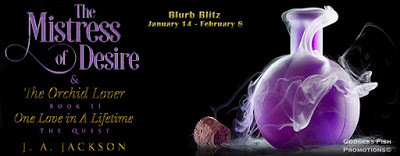
This post is part of a virtual book tour organized by Goddess Fish Promotions. J. A. Jackson will be awarding a $25 Amazon/BN GC to a randomly drawn winner via rafflecopter during the tour. Click on the tour banner to see the other stops on the tour.
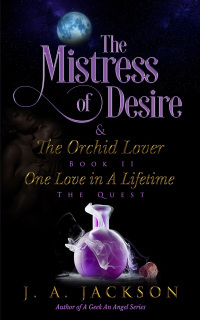
Neither Tiara Blake or Delmar Devereaux has a past to be proud of. With a joint history packed with dishonesty, blackmail—and a juicy, torrid love affair—the pair didn’t expect their paths would cross again.
Can a quest to break an ancient curse give two former lovers a second chance?
After a torrid love affair, shady businessman Delmar Devereaux disappeared from Tiara Blake’s life, leaving her to raise their twin sons on her own. So, when he shows up unannounced one day, her first instinct is to kick him to the curb.
But Delmar has discovered a centuries-old curse placed on the pair by their ancestors—and he needs Tiara’s help to break it. Ending the curse means they will have to learn to trust each other, which won’t be easy when their explosive secrets are revealed.
Once again torn between lust and duty, can Delmar and Tiara discover the true meaning of love in order to break the curse before it’s too late? Or will their complicated past doom them forever?
Join Delmar and Tiara in Book II of the Mistress of Desire and the Orchid Lover on their sensually sizzling action-packed adventure!
Read an Excerpt:
The room was silent except for the echoing sound of Nona’s vintage alligator peep-toed pumps as they slammed across the floor, as she charged in.
“You are late!”
“Now Glenda,” Nona excitedly exhaled. “You know I told you I had to go to Pointe Richmond, today? My favorite store was having their fifty percent off annual sale.”
Surprise and embarrassment ran a swift race across Glenda’s face. “Did you go to Ancient Ways? Oh, I’d forgotten.”
Nona hurried over and thrust a bag in Glenda’s hand. “See, I got you something.”
“Thank you,” Glenda muttered, with an apologetic tone in her voice.
Nona turned and made a beeline across the room. “Oh, and here’s yours Consuelo,” she said excitedly, handing her a bag.
Nona sighed heavily. “For some reason, the traffic on Highway 80 was ridiculous today.”
“Thank you, Nona,” Consuelo smiled and let her eyes settle on Nona’s for a second before she nodded agreement. “It’s true, about the traffic being heavy on Highway 80, today. Just this morning I saw it on the news, something to do with a big rig turning over,” she said, with a heavy Spanish accent.
Nona leaned in close and whispered. “Thanks for having my back Consuelo. By the way, I picked you up some that Herb man’s best sage, the one you like.”
“Excellent,” Consuelo replied with a look of surprise. “You must have read my mind. I was almost out.”
About the Author:
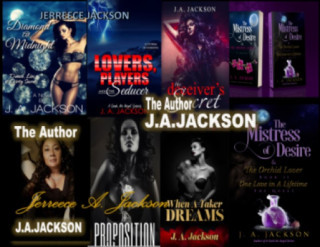
J.A. Jackson is the pseudonym for an author, who loves to write deliciously sultry adult romantic, suspenseful, entertaining novels with a unique twist. She lives in an enchanted little house she calls home in the Northern California foothills.
She spent over ten years working in the non-profit sector where she wrote grants, press releases and contributed many stories to their newsletter. She was their Newsletter editor for over ten years. She loves growing roses, a good pot of hot tea, chocolate, magical stories, suspense stories, ghost stories, and reading Jane Austen again and again in her past time.
https://www.amazon.com/author/jajackson
http://jerreeceannjackson.blogspot.com
http://www.facebook.com/pages/Jerreece-Ann-Jackson/204377496289139
https://www.amazon.com/-/e/B01ISNR0B2
https://www.amazon.com/dp/B07HR1KSHN
J. A. Jackson will be awarding a $25 Amazon/BN GC to a randomly drawn winner via rafflecopter during the tour.
January 30, 2019
VBT – SMUGGLER
[image error]
Smuggler
by Nicholas Fillmore
~~~~~~~~~~~~~
GENRE: Memoir/True Crime
~~~~~~~~~~~~~
BLURB:
When twenty-something post-grad Nick Fillmore discovers the zine he’s been recruited to edit is a front for drug profits, he begins a dangerous flirtation with an international heroin smuggling operation and in a matter of months finds himself on a fast ride he doesn’t know how to get off of.
After a bag goes missing in an airport transit lounge he is summoned to West Africa to take a voodoo oath with Nigerian mafia. Bound to drug boss Alhaji, he returns to Europe to put the job right, but in Chicago O’Hare customs agents “blitz” the plane and a courier is arrested.
Thus begins a harried yearlong effort to elude the Feds, prison and a looming existential dead end…. Smuggler relates the real events behind OITNB.
[image error]
~~~~~~~~~~~~~
Excerpt:
At the other end of the terminal was another set of steel doors—simple double doors leading right out to the street, daylight and fresh air strobing through each time someone exited; cabs lined up and waiting, freedom lingering out there.
I hoisted my bag over my shoulder, bypassing the baggage carousels where a cop was walking around with a dog, and headed towards the doors. A single Customs Agent was perched on a stool to the far right, reading a magazine. As I got about a third of the way there, he seemed to stir. I changed direction ever so slightly.
He roused himself. A small group was moving toward him from the right, but he seemed to ignore them.
I looked out the corner of my eyes for someone, anyone I could fall in behind, but everyone seemed blissfully out of reach—and I imagined this is what it must feel like to drown: to take one last desperate look at help swimming strongly away.
Then the agent sauntered ever so slowly out into the middle of the room. My heart raced. Then he looked up. I saw it coming, could feel it coming. Oblivious to the rest of the herd, he’d singled me out; and for a second I felt I might just swoon right there. Then some sort of instinct kicked in. I resigned myself to being questioned and headed right at him.
For some seconds he hung back as I did my best to play the part of the unassuming traveler.
“Where are you coming from, sir?” he asked, at an angle.
“Paris,” I said.
“Can I see your ticket?”
I handed him my ticket.
“How long were you in Paris?”
“A week.”
“What were you doing there?”
“Business.”
“What kind of business.”
“Magazine. Publishing.”
“What magazine?”
And here I faltered. Nun Civa Orcus. What the hell was that? My mind raced for all sorts of explanations. For a second I considered making something up. But that would only mean trouble. You tend to say stupid things when you veer from the script like that. Someone might ask your name, for instance, and under duress you might say Peter Rabbit or Dick Nixon, who the hell knew? Had he detected my hesitation? I had to speak.
~~~~~~~~~~~~~
AUTHOR Bio and Links:
[image error]
Nicholas Fillmore attended the graduate writing program at University of New Hampshire. He was a finalist for the Juniper Prize in poetry and co-founded and published SQUiD magazine in Provincetown, MA. He is currently at work on Sins of Our Fathers, a family romance and works as a reporter and lecturer in English. He lives on windward Oahu with his wife, his daughter and three dogs.
Author website: http://www.nicholasfillmore.com
Publisher Website http://www.iambicbooks.com
https://www.facebook.com/Nicholas.Fillmore.10/
https://twitter.com/nicholasfillmor
~~~~~~~~~~~~~
RAFFLECOPTER GIVEAWAY
Nicholas Fillmore will be awarding a $10 Amazon/BN GC to a randomly drawn winner via rafflecopter during the tour.
VBT – FOR HER HONOR

This post is part of a virtual book tour organized by Goddess Fish Promotions. Holly Bush will be awarding a $25 Amazon or Barnes and Noble GC to a randomly drawn winner via rafflecopter during the tour. Click on the tour banner to see the other stops on the tour.
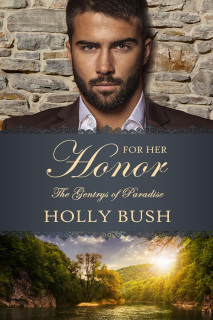
1873 –
Adam Gentry, heir to the celebrated Paradise Stables in Virginia, is haunted by the visions of his lost love. Feeling cursed by fate, he slips deeper into grief, shrouded in a cloud of liquor and depression, and neglects his duties and responsibilities. But when Adam is forced to accept that there’s nothing he can do to change his past, he knows he must move on.
And he accepts his own destiny: that he will never love again.
Emmaline Somerset finds herself in the worst possible position any unmarried woman can be in. She will have to abandon all of her plans, hopes, and dreams for an independence using her own talents. The only viable solution is to move to a distant relative’s home and reinvent herself as a widow with an infant. No one will ever be the wiser.
Adam, now determined to secure the Gentry legacy, plans to save longtime family friend Emmaline from her embarrassment with an offer of marriage. But what Adam didn’t plan on was how his unexpected attraction to her would stir something inside of him, something he’s kept locked deep within.
Can love finds its way between two troubled souls, one driven by duty, the other by honor, both determined to find their way home?
Read an Excerpt:
Emmaline Somerset’s bedroom door opened, and her mother poked her head inside.
“Mother, please,” she began but stopped speaking as the door opened wide and Adam Gentry walked into her room.
“I know this is unusual, Mrs. Somerset, but certainly you’ve known me and my family long enough to know that I intend nothing untoward. But I would like to speak to your daughter alone.”
Adam stared at her as he spoke to her mother and she could see Jane and Betsy behind him, eyes wide and their hands over their mouths.
“It’s not p-proper, Adam,” her mother stuttered.
“I’m fine, Mother. Stand outside my door if you wish.”
Emmaline looked at him and noticed that he was thinner than the last time she saw him. He was still very handsome and even intimidating, filling the room with his presence. He was the oldest among her generation of Gentrys and Somersets but had been removed a bit from the rest of them as they grew up together. A bit apart from John and Matthew and Jim, who’d been fast friends growing up, and from Olivia and Nettie and Marabelle Winston, whose family owned the mercantile, and her. He hadn’t been aloof, but he hadn’t gotten into the same type of trouble that John and Matthew had.
Women swooned over him, and he smiled back and tipped his hat in such a way that made a female feel as if she was the only person of her sex in the world. Except right now he wasn’t looking so sure of himself and not particularly happy, either.
About the Author:
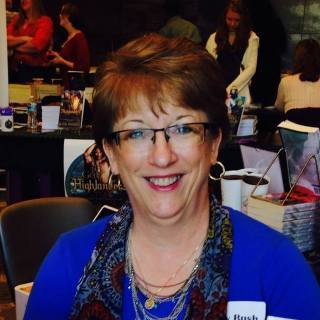
Holly Bush writes historical romance set in the U.S.in the late 1800’s, in Victorian England, and an occasional Women’s Fiction title. Her books are described as emotional, with heartfelt, sexy romance. She makes her home with her husband in Lancaster County, Pennsylvania.
http://www.hollybushbooks.com
http://www.twitter.com/hollybushbooks
https://www.facebook.com/pages/Holly-Bush/247399131941435
http://www.amazon.com/Holly-Bush/e/B006ZDTQ1A/ref=ntt_athr_dp_pel_pop_1
Holly Bush will be awarding a $25 Amazon or Barnes and Noble GC to a randomly drawn winner via rafflecopter during the tour.
January 27, 2019
Spotlight – The Liebold Protocol
[image error]
About the Authors
[image error]
Michael McMenamin is the co-author with his son Patrick of the award winning 1930s era historical novels featuring Winston Churchill and his fictional Scottish goddaughter, the adventure-seeking Hearst photojournalist Mattie McGary. The first five novels in the series—The DeValera Deception, The Parsifal Pursuit, The Gemini Agenda, The Berghof Betrayal and The Silver Mosaic—received a total of 15 literary awards. He is currently at work with his daughter Kathleen McMenamin on the sixth Winston and Mattie historical adventure, The Liebold Protocol.
Michael is the author of the critically acclaimed Becoming Winston Churchill, The Untold Story of Young Winston and His American Mentor [Hardcover, Greenwood 2007; Paperback, Enigma 2009] and the co-author of Milking the Public, Political Scandals of the Dairy Lobby from LBJ to Jimmy Carter [Nelson Hall, 1980]. He is an editorial board member of Finest Hour, the quarterly journal of the International Churchill Society and a contributing editor for the libertarian magazine Reason. His work also has appeared in The Churchills in Ireland, 1660-1965, Corrections and Controversies [Irish Academic Press, 2012] as well as two Reason anthologies, Free Minds & Free Markets, Twenty Five Years of Reason [Pacific Research Institute, 1993] and Choice, the Best of Reason [BenBella Books, 2004]. A full-time writer, he was formerly a first amendment and media defense lawyer and a U.S. Army Counterintelligence Agent.
[image error]
Kathleen, the other half of the father-daughter writing team, has been editing her father’s writing for longer than she cares to remember. She is the co-author with her sister Kelly of the critically acclaimed Organize Your Way: Simple Strategies for Every Personality [Sterling, 2017]. The two sisters are professional organizers, personality-type experts and the founders of PixiesDidIt, a home and life organization business. Kathleen is an honors graduate of Sarah Lawrence College and has an MFA in Creative Writing from New York University. The novella Appointment in Prague is her second joint writing project with her father. Their first was “Bringing Home the First Amendment”, a review in the August 1984 Reason magazine of Nat Hentoff’s The Day They Came to Arrest the Book. While a teen-ager, she and her father would often take runs together, creating plots for adventure stories as they ran.
WEBSITE & SOCIAL LINKS:
WEBSITE | FACEBOOK
About the Book:
[image error]
Title: THE LIEBOLD PROTOCOL: a Mattie McGary + Winston Churchill World War 2 Adventure
Author: Michael & Kathleen McMenamin
Publisher: First Edition Design Publishing
Pages: 389
Genre: Historical Thriller
BOOK BLURB:
Winston Churchill’s Scottish goddaughter, Mattie McGary, the adventure-seeking Hearst photojournalist, reluctantly returns to Nazi Germany in the summer of 1934 and once again finds herself in deadly peril in a gangster state where widespread kidnappings and ransoms are sanctioned by the new government.
Mattie turns down an early request by her boss Hearst to go to Germany to report on how Hitler will deal with the SA Brown Shirts of Ernst Rohm who want a true socialist ‘second revolution’ to follow Hitler’s stunning first revolution in 1933. Having been away from Germany for over a year, her reputation as “Hitler’s favorite foreign journalist” is fading and she wants to keep it that way.
Instead, at Churchill’s suggestion, she persuades Hearst to let her investigate one of the best-kept secrets of the Great War—that in 1915, facilitated by a sinister German-American working for Henry Ford, British and Imperial German officials essentially committed treason by agreeing Britain would sell raw rubber to Germany in exchange for it selling precision optical equipment to Britain. Why? To keep the war going and the profits flowing. After Mattie interviews Ford’s German-American go-between, however, agents of Scotland Yard’s Special Branch are sent by Churchill’s political opponents in the British government to rough her up and warn her she will be prosecuted under the Official Secrets Act unless she backs off the story.
Left no choice, Mattie sets out for Germany to investigate the story from the German side and interview the German nobleman who negotiated the optics for rubber deal. There, Mattie lands right in the middle of what Hearst originally wanted her to investigate—Adolf Hitler believes one revolution is enough—and she learns that Hitler has ordered the SS to assassinate all the senior leadership of Ernst Rohm’s SA Brown Shirts as well as other political enemies on Saturday 30 June, an event soon known to History as ‘The Night of the Long Knives’.
Mattie must flee Germany to save her life. Not only does the German-American working for Henry Ford want her story on the optics for rubber treason killed, he wants her dead along with it. Worse, Mattie’s nemesis, the ‘Blond Beast’ of the SS, Reinhard Heydrich, is in charge of Hitler’s purge and he’s secretly put her name on his list…
ORDER YOUR COPY:
Amazon
Book Excerpt:
Mattie McGary
21 Club
21 West 52 nd Street
New York City
Wednesday, 13 June 1934
MATTIE McGARY tipped the taxi driver and stepped from the Yellow Cab and walked under the portico of the 21 Club, the former 1930’s speakeasy that had become, after the end of prohibition, one of the most popular watering holes in New York. It was known to its regulars, of which Mattie was one, as Jack and Charlie’s or simply 21. She was a few minutes early, but she didn’t want to keep her boss, William Randolph Hearst, waiting. The new Hearst headquarters building was just up the street at West 57th and Eighth Avenue and he also might be early.
Mattie was a tall, attractive and some—including her husband—would say stunning redhead whose figure turned heads in any room she entered. Now, she entered the Bar Room at 21 and stood there, scanning the room until she saw Hearst at his favorite table, #4, in the far left-hand corner of the room. Her hair was cut in a short tousled style that she had somewhat patterned after the American aviatrix Amelia Earhart. She wore a royal blue matching silk jacket and form-fitting skirt flattering a figure that, judging from the number of male heads that turned as she waved at Hearst and walked the length of the dark mahogany-lined room, drew men’s attention wherever she went. As she was the only woman in the Bar Room, she had no doubt most men were checking out her ass. She had wedding and engagement rings on her left hand, but she knew what her assets were.
There were various model aircraft hanging from the Bar Room’s low, dark ceiling. These included a British Imperial Airways Flying Boat, a Pan American Clipper, Lindbergh’s Spirit of St. Louis, a Ford Tri-Motor, a giant Handley-Page HP-42 bi-plane airliner, and, of personal interest to her, a Pitcairn-Cierva PCA-2 autogiro and the new German Zeppelin, the Graf Bismarck, formerly the British Vickers-built airship the R-100.
The autogiro was a model of the Celtic Princess, her husband Bourke Cockran’s aircraft. A few years ago she and her then-fiancé had flown it cross-country in an unsuccessful attempt to break America Earhart’s record set earlier that year. The zeppelin was the model of an airship commanded by her good friend Kurt von Sturm with whom, to her regret, she had a brief affair several years ago when she and Cockran had been briefly estranged and she thought, erroneously, that he had dropped her and taken up with a new blonde client.
Hearst stood up to greet Mattie when she arrived at his table. They exchanged brief kisses on the cheek and then a waiter arrived to pull out the table so she could sit beside him on the banquette. 21 had a specific protocol that if two people were dining together at a banquette table, then they had to sit next to each other facing out to the room.
Hearst was a tall, shambling man, well over 6 feet with a comma of gray hair boyishly falling over his forehead. He had clear, blue eyes and didn’t look his 71 years of age. For such a large man, however, he had a surprisingly high voice.
“Thanks for joining me for lunch, Mattie, I appreciate it.”
Mattie had been surprised Hearst asked her to lunch at 21 when she called him yesterday to schedule an appointment to discuss her next assignment. Usually, on those occasions, they met at his castle-like estate on Long Island Sound when he was on the East coast. “Any time you want to treat me to lunch at Jack and Charlie’s, Chief, all you have to do is ask and I’ll be there with bells on. What’s the occasion?”
Hearst smiled. “I always take my Pulitzer-Prize-winning journalists to celebrate at 21.”
“Well, Chief, this is the second year in a row I’ve had some stories nominated for a Pulitzer, but that’s not the same as being a winner.”
In fact, Mattie had four stories from 1933 nominated for a Pulitzer, all of which she believed deserved to be winners. One involved the Transfer Agreement between the Jewish Palestine Authority and the German government in which the Nazis agreed to allow Jews emigrating to Palestine to avoid the currency rules which forbade any German emigrant from taking assets with him. In exchange for allowing emigrating Jews to take with them to Palestine the equivalent of $5,000 US, the Jewish Palestine Authority agreed to buy exports of agricultural equipment from Germany in an equivalent amount. Further, the Jewish Authority agreed to actively oppose the Jewish-led worldwide boycott of German exports that was threatening to cripple the German economy and bring down the new Nazi government.
A companion story concerned the Concordat negotiated between the Vatican and the Nazis whereby the German government agreed to allow the Catholic Church to operate freely in Germany with no interference. In exchange, the Church agreed to forbid its clergy—priests, monks and nuns—from engaging in ‘political activity’ of any kind with the Nazis being the sole arbiter of what constituted ‘political activity’.
The third story consisted of exclusive interviews with the new German Chancellor, Adolf Hitler, and the new U.S. President, Franklin Roosevelt, right before assassination attempts on both where Mattie had been sitting beside them during the attempts. A fourth story concerned the rise of the fascist movement in America, focusing on the Silver Legion of America and Friends of New Germany.
Hearst raised his hand and a waiter came over with a silver bucket of ice on a pedestal, inside of which was a bottle of champagne. He placed two champagne flutes on the table and held the bottle up for Hearst’s inspection. He nodded his approval and the waiter undid the foil, popped the cork and filled Mattie’s flute halfway to the top. She smiled when she noticed the champagne was Pol Roger, the favorite of her godfather Winston Churchill.
Once Hearst’s flute was filled, he stood up, tapped his spoon against the flute until the buzz of noise from the many luncheon conversations in that section of the room had died down. Then he raised his flute and said in a loud voice that carried to the front of the Bar Room. “I propose a toast to the Hearst organization’s newest Pulitzer Prize winner.”
Mattie blushed as applause and not a few wolf whistles greeted Hearst’s toast.
“Really, Chief, I won?” Mattie asked as she reached over and hugged Hearst after he sat down. “Which story was it?” she asked, her voice full of excitement.
“Actually, it was all four stories and two prizes. You received the prize for ‘Correspondence’ for your stories from Germany on the Transfer Agreement and the Concordat. I think it was your interview with Hermann Göring that did the trick. No other story had that. You got the ‘Reporting’ prize for your stories on the Hitler and FDR assassination attempts after your exclusive interviews with them as well as your story on American fascists. The panelists were impressed by your courage under fire with Hitler and FDR as well as your running the gauntlet of the Silver Shirts and the Friends of New Germany in front of Severance Hall in Cleveland.”
Hearst reached down into a briefcase beside him and pulled up a galley proof of The New York American dated for tomorrow and handed it to her. There, on the front page and above the fold was a bold headline: ‘Two Pulitzers For Hearst Papers’ Mattie McGary’. Right below it was a two-year-old photo of Mattie standing in front of Cockran’s autogiro that she had just flown across the country, almost breaking Amelia Earhart’s record. Shot from below, it was her favorite. She was wearing a leather flying outfit from head to toe—a shearling–lined sheepskin flying jacket, trousers and boots—a camera in one hand, her leather flight helmet and goggles in the other, her tousled red hair blowing in the wind and a big grin on her face.
“That’s only the galley for The American,” Hearst said, “but the same story in the same place will run in all my papers tomorrow.”
Thanks, Chief,” Mattie said as she leaned over and kissed him on the cheek. “I really appreciate it.”
“It’s a shame,” Hearst said, “that the Transfer Agreement and the Concordat undercut the anti-Nazi boycott of German exports that otherwise might have crippled the German economy and brought down the new Nazi government.”
“True, it didn’t do that,” Mattie allowed, “but don’t overlook the silver lining of the boycott. It accomplished two big things. It’s all there in my interview with Göring. First, Hitler issued a directive to the SA and its brown-shirted Storm Troopers to cease any actions like boycotts against the mostly Jewish-owned department stores and their suppliers. He even authorized a loan to a Jewish Department store that was close to bankruptcy. Sure, Hitler only did it to keep thousands of Aryans off the unemployment rolls if any department stores had to close their doors because of brown-shirt bullying, but he still did it and those stores remained open and prospering.”
Mattie paused and took a sip of champagne. “The second thing Hitler and Göring did in response to the boycott last year was even bigger. They forbade all violence against the Jews that the SA had been committing without authorization of the government. The penalty for doing so was, at a minimum, confinement to a concentration camp or, at the other end, death.”
“Really, death?” Hearst asked. “I don’t recall you mentioning that in your article.”
“I didn’t go into any detail,” Mattie replied, “and only mentioned it in passing. You remember Bobby Sullivan?”
“Sure, I first met him at San Simeon in 1929 right before the reception of the Graf Zeppelin when it arrived in Los Angeles on the round-the-world voyage I sponsored. He was in your wedding party last year in Scotland. Wasn’t he ex-IRA or something?”
“More like the Irish Republican Brotherhood led by Michael Collins. He was a member of ‘The Apostles’, Collins’ hit squad in the Anglo-Irish War in 1920 to 1921. Anyway, Bobby’s sister was married to a Jewish physician in Berlin who the SA castrated and killed last year. Göring practically gave Bobby a license to kill in taking revenge on all those responsible. He showed me photographs of Bobby’s six victims, all of them naked below the waist and missing their manly parts. Each man had a sign pinned to his chest that said ‘This is what happens to all who disobey the Fuhrer and kill Jews without his consent.’ We obviously couldn’t use them in your papers, but Göring actually had them published on the front page of Der Angriff .”
“Congratulations, Miss McGary,” the waiter said as he returned to their table to take their lunch orders. Mattie thanked him and then ordered a dozen oysters and chicken hash while Hearst went for the Dover Sole and, to her surprise, another bottle of Pol Roger. Her boss rarely drank alcohol and, in fact, prohibited alcohol in the guest rooms at San Simeon, his elaborate Spanish mission-style estate in Central California.
“I must say Göring was right,” Mattie continued after the waiter had left, “when he said the SA loved their, uh, genitals more than they hated Jews because violence against Jews over the course of the next year practically disappeared, especially in large cities where most German Jews live. I think the boycott deserves the credit for forcing Hitler’s hand to issue those decrees.”
“Okay, Mattie, what’s next? What are you going to give me to enter in next year’s Pulitzers? I’d really like to see you follow up on that SA leader Ernst Rohm and the story our Berlin correspondent filed in March about a speech he gave in early February. He said that the SA was the true army of National Socialism and that the Reichswehr should be limited to being a training organization for the SA. I’d like to know what your friend Göring thinks about that, not to mention the German General Staff.”
Mattie frowned. It had been well over a year since last she had been in Germany. As a consequence, her reputation in Germany as ‘Hitler’s favorite foreign journalist’ was beginning to fade. The last thing she wanted to do was revive that by doing a story on the SA and the German Army, notwithstanding that she had many high-level contacts in Nazi Germany including Göring and the Nazi foreign press chief Ernst ‘Putzi’ Hanfstaengl as well as Hitler himself.
“Göring is not my friend, Chief. He is a source and that only because my friend Kurt von Sturm is his principle adviser on airships. Speaking of airships, Bourke and I are flying to Europe this Saturday on the Graf Bismarck. We’re going to spend the summer at our new house in Ireland. Bourke is going to finish his book on political assassinations and I’m going to use it as a base of operations for what I hope you’ll approve as my next story. Patrick and his grandmother Mary Morrissey sail tomorrow for Ireland. He’s going to spend a month in Galway with her getting to know his first and second cousins before he comes up to join us in Donegal.”
“That sounds like a wonderful summer. What did you have in mind for your next story, my dear?”
“Fascist movements in Europe other than Germany and Italy. A companion piece, if you will, to my story on fascism in America. Democracy is in trouble, Chief. I’ve done the preliminary research and there are fascist movements all over Europe. If the world’s economy stays bad, many of them could come to power just like Hitler and Mussolini.”
Her oysters arrived and Mattie ate one, took a sip of champagne and continued.
She held up her hand, and ticked them off on her fingers. “There are strong fascist parties in Austria, Belgium, Finland, Hungary, Ireland, the Netherlands, Portugal, Romania and Poland.”
“Well,” Hearst began, “I suppose it would be a good follow-up to the American fascist story, but I really was hoping to have an in-depth piece on the growing tension between Rohm’s SA and the German General Staff who I imagine don’t take kindly to becoming just a training cadre for Nazi Storm Troopers. Our new Berlin correspondent, Prescott Talbot, is good, but he’s not as good as his predecessor Isaac Rosenbaum or, for that matter, you.”
Mattie began to reply, but she was interrupted by their entrées being served. After the waiter had left and she had sampled her chicken hash, she looked over at Hearst. “Yes, it’s a shame you had to reassign Zack, but you had no choice after those SA thugs fractured his skull and cut off his ear for a souvenir. London is a far safer place for a Jewish journalist. Look, I really don’t want to get involved in any story about Ernst Rohm.”
“Why is that?” Hearst asked.
“Because when I was working on the Transfer Agreement, Kurt von Sturm and I were kidnapped at the Reichsbank one night by SA Storm Troopers and brought to Rohm’s hotel suite where, in plain view, he was buggering one of his adjutants, a young, very naked blond Storm Trooper.”
Hearst’s eyes went wide. “Oh, my God!” Hearst exclaimed. “I had no idea.”
“Wait. It gets worse. It’s common knowledge that Rohm is homosexual, so I wasn’t surprised, but doing it right in front of us was a tad off-putting. What’s worse is that he threatened to do the same to me if Kurt and I didn’t tell him why we had been at the Reichsbank that evening.”
“That’s…I’m at a loss…What a horrible person.” Hearst said.
“Yep,” Mattie said and slurped another oyster. “Fortunately, Sturm bluffed our way out of Rohm’s clutches. He said that I was an undercover Gestapo agent who used my position as a journalist with the Hearst papers as a cover for my work for the Reich and that we had been on a top-secret mission inside the Reichsbank at the behest of Reichsminister Göring with the blessing of the Fuhrer.”
“Well, given that, I understand your reluctance to go anywhere near that man again, but can’t you do the story without interviewing him?” Hearst said.
“Here’s what I can do. “Mattie concluded, “Göring and Rohm are bitter enemies. I’ve known Göring since 1923 when he commandeered my motorcar as a machine gun platform in the Munich putsch. If I have Sturm convey my request to Göring to have him give an exclusive interview to Prescott Talbot on the subject of Ernst Rohm, I’m sure he’ll agree. I’ll have Kurt brief Talbot off the record on what he knows. Göring has wiretaps on all the top SA people, not just Rohm. Transcripts of the calls are made daily. They’re called the ‘Brown Pages’ because of the color of the paper on which they’re typed. Sturm is on the approved list so he may well know a lot about what Rohm and other SA thugs are up to.”
Hearst sighed. “Well, it’s not the same as you doing the interview, but it’s better than what Talbot could do on his own. I’m not enthusiastic about your European fascist story, but let me think about it some more and I’ll get back to you. Why do I have the idea you always get the better of me when we disagree on your next story?”
Mattie grinned. “A faulty memory on your part, Chief. Sooner or later, you always get your way.”
January 23, 2019
BUZZ: THE ULTIMATE GUIDE TO BOOK MARKETING
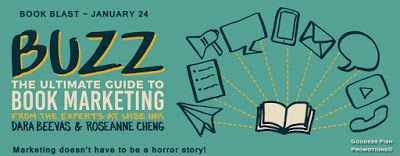
This post is part of a virtual book tour organized by Goddess Fish Promotions. The authors will be awarding a 30 minute book marketing consultation to a randomly drawn winner via rafflecopter during the tour. Click on the tour banner to see the other stops on the tour.
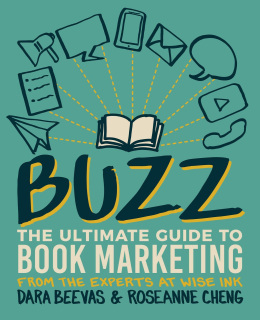
Congratulations, indie author!
You’ve finished your book—now all that’s left is to get it out into the world. Unfortunately, for many authors, it’s that step of the process that’s the hardest. Marketing is seen as something to be feared, dreaded, and outsourced as much as possible—a daunting task that will leave you drained.
But fear not! The team at Wise Ink knows a thing or two about how to sell your book. And they’re here to tell you everything.
Buzz is the indie author’s ultimate guide to marketing effectively, inexpensively, and excitingly. Within its pages, you’ll find answers to the questions on every writer’s mind:
• What does it really mean to “market” my book?
• How do I best reach my specific audience?
• What are effective ways to promote my book via social media?
• Do I really need to be a public speaker?
In addition to this, the Wise Ink marketing team has provided sample content calendars, email promotions, a marketing starter kit, and more to ensure you’re prepared to get out there and sell your book.
Marketing doesn’t have to be a horror story! Let Buzz teach you how to take your book to its maximum potential.
Read an Excerpt:
How do I best reach my specific audience?
You will hear us say this over and over again, as it is one of the Ten Commandments of book publishing: Know thine audience!
Think carefully about your “ideal” reader. What do they do in their spare time? Where do they normally purchase things? Where do they go for information? And most importantly, what are some unique and organic ways to get your book and message in front of them?
Hopefully, by the time you begin marketing your book, you will have already thought through these things carefully. Still, it’s a good idea to refresh your memory. Also, be concrete in how you determine your market demographics. Go deeper than the standard questions around gender, age, education, and geographic location. Those are just places to start.
When describing your ideal reader, be specific with the details that matter, such as how much time they have to read, how they might use your book day-to-day, and how they generally make recommendations to others. Another thing to do is segment your readers into three specialized subgroups—communities that align with each reader’s professional identities and personal aspirations. This helps you dig even deeper into the psychology of how to sell your book smartly and where it makes the most sense to spend your time. As an example: To market your business book, you might segment your readers into millennials and recent grads, aspiring entrepreneurs, and motivational speakers. If you’ve just published a sci-fi thriller, your subgroups might include fans of the popular sci-fi series Black Mirror, sci-fi writers who frequent fan-fiction sites, and people who attend conventions like WorldCon.
How does your ideal reader obtain information? Blogs? Magazines? Newspapers? Ads? What social media sites do they frequent? Be as specific as you can here. These are the places you will want to target in terms of marketing.
Where does your ideal reader shop? Think beyond bookstores. Are they frequent travelers? (Maybe they shop in airports a lot.) Do they have stores they tend to gravitate toward? Make a list of these places, and find connections there to share your book with.
About the Authors: Roseanne Cheng is a former high school English teacher and author of two young adult books, The Take Back of Lincoln Junior High and Edge the Bare Garden, which won the gold medal for young adult fiction at the Writer’s Digest Self Published Book Awards and the Moonbeam Children’s Book Awards. She now works as Marketing Director at Wise Ink Creative Publishing where she holds the secondary title of “Author Therapist” and has the pleasure of helping authors create plans to get their work into the world. When she’s not reading a book or practicing yoga, you can probably find her hanging out with her hilarious husband of ten years and their two ridiculously awesome kids. Follow her on Twitter http://www.twitter.com/teachablelit.
Dara Beevas believes that books can save lives, open doors, and build bridges. As co-founder of Wise Ink, she encourages authors to share powerful stories that ignite change, tolerance, and growth. She has been involved in the publishing community for fifteen years, acquiring manuscripts, managing projects, and creating marketing and sales strategies for authors and publishers. She’s helped more than four hundred authors publish their books. She is the author of The Indie Author Revolution and co-author of Social Media Secrets for Authors. When she’s not busy pushing the envelope in this crazy world of publishing and networking with inspiring entrepreneurs, she’s traveling and enjoying her husband Tomme’s delicious Jamaican meals with her daughter Genesis. Follow her on http://www.twitter.com/darairene or http://www.instagram.com/darairene.
Website: http://www.wiseink.com
Facebook: https://www.facebook.com/WiseInkPub
Twitter: https://twitter.com/Wiseink
Instagram: http://www.instagram.com/wise_ink
Pinterest: http://www.pinterest.com/wiseink/pins/
Buy Link: https://wiseink.com/store/buzz-the-ultimate-guide-to-book-marketing
The authors will be awarding a 30 minute book marketing consultation to a randomly drawn winner via rafflecopter during the tour.



